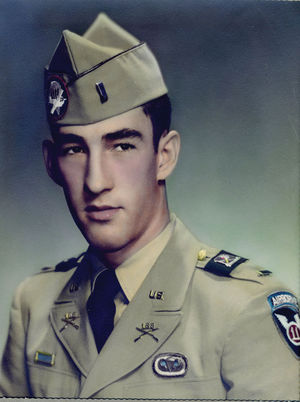
By Carole Robinson • Senior Staff Writer
For Col. Wallace Stanley Tyson, service didn’t end when he retired from the Army in 1976.
He has been a substitute teacher, a member of the board of zoning appeals, a county commissioner for the ninth district, a highway commissioner and the county’s veteran’s service officer.
Tyson, a Nashville native, graduated from West High School in 1948.
An ROTC scholarship allowed him to attend the University of Tennessee. He graduated in 1952 with a degree in agriculture, a commission in the U.S. Army and a career that would take him all over the world.
“My first assignment was with the 11th Airborne Div. Infantry at Fort Campbell as a platoon leader,” he said.
For eight months, he trained infantry troops.
In August of 1953, he married Dorothy Lane of Williamson County before being sent to Korea as part of the 2nd Infantry Div. KAMG (Korean Military Advisory Group).
After eight months with KAMG, he was transferred to the 8th Army Guard in Seoul for another eight months.
Upon returning to the states, Tyson was assigned to Fort Gordon in Georgia where he worked in Civil Affairs — the agency that assisted combat troops get reestablished when they returned home.
He also handled the processing at Camp Kilburn in New Jersey of 25,000 to 30,000 Hungarians who escaped the massacres during of the Hungarian revolution in 1956.
When the Hungarian migration settled down, Tyson was sent to the 2nd Division at Fort Benning, Georgia - the ‘Home of the Infantry’ and the U.S. Infantry School where Tyson was once again assigned to troop training.
From 1960 to 1964 he came closer to home, training ROTC at Middle Tennessee State University and teaching military history.
In August 1964, Major Tyson was sent to Vietnam as part the 3rd Army, 2nd Battalion 35th Infantry during the Tonkin Bay Incident off North Vietnam.
Months later, Tyson was back on U.S. soil with the 25th Infantry Division stationed at Schofield Barracks in Hawaii and with Dorothy and their two children.
The 25th Infantry Division 3rd Brigade was deployed to the central highlands of Pleiku, South Vietnam in January 1966 with Tyson as commander of the 1st Battalion, 12th Cavalry — a component of the 1st Air Cavalry Division.
“We were primarily in War Zone D, where, with helicopter support, we monitored 500 square miles, one 12-mile circle at a time,” Tyson said.
To monitor the area “we built small forts made with dirt, sand bags and barbed wire called firebases,” protected by artillery with a six-mile range. They were temporary base headquarters that moved frequently.
Once soldiers cleared the 12-mile area of North Vietnamese, the base moved.
Every two to three weeks, soldiers returned to base to “clean up, treat insect bites, get healthy and rested,” Tyson said. “If they had any wounds, we got them out of there. Out in the jungle they are exposed to all sorts of insects.”
The 25th Infantry Division, the Tropic Lightning Soldiers, fought in some of the toughest battles of the war including the 1968 and 1969 Tet offensives.
They remained in Vietnam, “until we brought the battalion colors home and the battalion stood down in June 1972,” Tyson said.
“We were the last battalion still in the jungle when it came time to stand down.”
When Tyson returned home he was sent to Army War College in Carlisle, Pennsylvania where he completed a Masters degree in mass communications.
He even hosted a radio show, where one of his responsibilities was to read obituaries.
During this period, he was also promoted to colonel.
In the fall of 1975, Tyson, his wife, Dorothy, and their son, Eric, moved to Germany.
Their daughter Teresa remained in the U.S. to complete high school and begin college.
While in Germany, Tyson commanded a brigade of close to 7,000 soldiers, but after 24 years in the military, the Tysons decided it was time to go home for good.
“Dorothy’s parents’ health was deteriorating. It was time to go back,” he said.
The house the Tyson’s built in Williamson County in 1976 was the couple’s 24th residence.
Stan and Dorothy are still in that house.
Stan gives Dorothy credit for much of his success in the military.
“She did real well — outstanding — as far as the support she gave me,” he said.
“She is down-to-earth and could talk to anyone from commanders’ wives to young soldiers’ wives, from those who just finished high school to those with extensive education,” he said.
“She served as an intermediary between the wives and the Army, and she could handle it very well.”
“Of all I have contributed to Williamson County, I am most humble about Veteran’s Park,” a joint effort launched by Tyson, former county commissioner Judy Hayes and former chamber of commerce president Nancy Conway.
